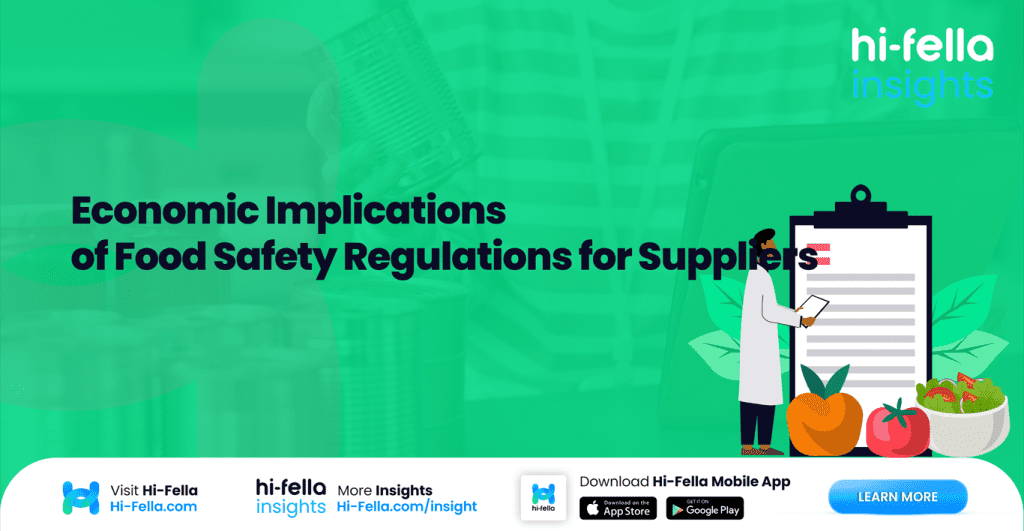Food safety regulations aren’t just about hygiene or hazard prevention—they shape the economics of global food trade. Whether you’re supplying dried fruit, seafood, dairy, or shelf-stable snacks, compliance with food safety laws is now central to market access, consumer trust, and long-term profitability.
For suppliers, these regulations can feel like a double-edged knife. On one hand, they offer credibility and open doors to high-value markets. On the other, they bring costs, complexity, and the constant need to stay updated. The question isn’t whether food safety regulation is a challenge—it’s how you handle it strategically.
Let’s unpack the economic implications of food safety rules and how smart suppliers can turn compliance from a cost centre into a growth engine.
The Cost of Compliance: Not Small, But Necessary
Implementing food safety systems isn’t a minor tweak—it’s a structural upgrade. Whether you’re pursuing HACCP, ISO 22000, BRCGS, or local certification schemes, the process involves both upfront and ongoing costs. Suppliers often need to invest in physical infrastructure upgrades like sanitary flooring, pest control systems, or stainless-steel processing lines. Beyond that, there’s the need for trained quality assurance staff, routine lab testing, detailed documentation, and sometimes specialised traceability software. Compliance also means inviting in third-party auditors and keeping detailed records that hold up under scrutiny.
For small to medium-sized food suppliers—especially in developing markets—these costs can feel overwhelming. Many are already operating on tight margins, and the idea of spending thousands on paperwork, certifications, and process adjustments can seem unrealistic. But here’s the unavoidable truth: non-compliance is more expensive in the long run. Without proof of food safety standards, your products can’t access modern trade channels, and many international buyers won’t even consider your offer. Regulatory compliance is increasingly the baseline, not the bonus.
High-value markets like the European Union, North America, and Japan maintain strict safety expectations. Buyers in these regions often need documentation as a condition of entry—whether you’re supplying snacks, seafood, or fresh produce. Retailers and distributors face their own liability if food safety standards aren’t met, so they prefer working with suppliers who are already certified. Without the right safety credentials, your customer pool shrinks dramatically, limiting your potential to scale and export.
That’s why it’s more useful to view compliance not as a bureaucratic hassle but as the price of serious business. These systems not only open access to new markets but also drive internal improvements. When implemented correctly, food safety systems enhance operational discipline, reduce product rejections, and minimise recall risks. Many suppliers also find that improved quality control helps reduce waste and boost customer satisfaction—delivering long-term savings and higher product consistency.
In other words, while food safety systems do cost money, they also create value. They make your business more investable, more credible, and more resilient. For suppliers thinking about long-term growth, especially into export markets, food safety isn’t just a checkbox—it’s a foundation. Invest now, or risk being excluded later. That’s the economic reality suppliers need to recognise—and act on.
Market Access and Competitive Advantage
Food safety isn’t just about avoiding risk—it’s a passport to new markets. Many import markets have specific safety and traceability requirements. The European Union, for example, enforces stringent rules around allergens, pesticide residues, and labelling. The United States has FSMA, which demands preventive controls and supply chain visibility.
Complying with these rules doesn’t just keep you in the game—it can help you win the game. When your product checks every regulatory box, you become more attractive to buyers who don’t want to risk dealing with non-compliant suppliers. It builds trust and accelerates deal closures.
Over time, safety-certified suppliers tend to gain premium positioning, especially in categories like organic, baby food, ready-to-eat, and exports to retail chains. In other words, food safety isn’t just compliance—it’s a value signal.
Risk Reduction and Business Continuity
Food safety issues can bankrupt a business overnight. Think product recalls, contamination scares, or regulatory blacklisting. One high-profile incident—whether real or exaggerated by media—can destroy years of brand equity and choke off revenue.
By investing in proper food safety systems, you reduce this risk dramatically. You also become more resilient in the face of inspection, audits, or sudden regulatory shifts. Insurance premiums may be lower, and operational downtime due to contamination incidents is minimised.
In financial terms, this is about protecting downside risk. Risk reduction might not show up as a line item on your income statement, but it absolutely reflects in your stability, investor confidence, and operational continuity.
Traceability as a Value-Added Feature
Modern food safety regulations go beyond cleanliness—they’re demanding traceability. From raw material sourcing to packaging and logistics, buyers and regulators want to know the journey of every batch.
Yes, setting up traceability systems requires investment. But it opens the door to value-added business models. With the right tech integration (like QR codes, blockchain, or ERP-linked dashboards), you can offer buyers real-time tracking, digital certification, and origin verification.
That’s powerful. For global retailers, traceability isn’t just compliance—it’s a marketing tool. If you can deliver transparency, you position yourself above commodity suppliers and command higher prices for the same product.
Challenges for Emerging Market Suppliers
Not all suppliers operate on a level playing field. In many developing countries, food businesses face limited access to testing labs, trained auditors, or affordable certification schemes. This creates structural inequality—suppliers with great products may still get sidelined due to paperwork gaps.
This is where collaboration and the right platforms matter. Governments, trade associations, and international buyers must invest in supplier development. And suppliers need tools that help them streamline documentation, prepare for audits, and connect with markets that value their effort.
Enter platforms like hi-fella, which bridge the gap between regulatory compliance and real-world export potential.
How hi-fella Helps Suppliers Navigate the Compliance Maze
Whether you’re preparing for your first international trade show or expanding into a regulated market, hi-fella is your strategic ally. The platform connects suppliers to verified buyers, guides them on certification requirements, and provides exposure through global exhibitions that prioritise compliant, traceable, and export-ready products.
hi-fella doesn’t just help you list your food products. It helps you build credibility, reduce friction, and accelerate trust in an industry that’s built on safety and reliability.
From halal-certified snacks in Indonesia to EU-compliant frozen produce in Thailand, suppliers across Asia are using hi-fella to make compliance work for their bottom line—not against it.
Food Safety = Smart Business
In a world of fast-moving trade, strict regulation, and increasingly savvy consumers, food safety is no longer a box to tick—it’s a strategic advantage. It influences pricing, brand perception, buyer confidence, and international scalability.
Yes, there’s a cost to implementing safety systems. But there’s a much bigger cost in ignoring them. Suppliers who treat food safety as part of their business model—not just a regulation to dodge—will win the trust of global buyers and grow sustainably.
Ready to turn compliance into opportunity? Trade smarter, scale faster, and stand out globally with hi-fella—your trusted platform for food exhibitions, export-import guidance, and supply chain excellence.








